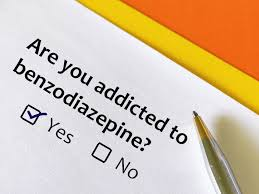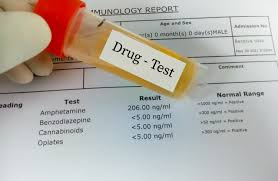Benzo Addiction Treatment
Immediate
Placement Available at our Top-Rated Treatment Centers.
Please call us at (855) 410-4488. We work
with most major insurance providers and offer flexible payment
options!
Atrium Addiction Care offers a variety of treatment choices and programs for individuals struggling with drug or alcohol addiction. Our inpatient treatment programs are designed for those who have more severe substance use problems and require 24-hour care. We admit both voluntary and involuntary patients.

Benzodiazepines, commonly known as benzos, are a class of prescription drugs used to treat anxiety disorders and insomnia. While these medications can be effective in managing symptoms of sleep disorders, they carry a high risk for addiction and dependence.
Unfortunately, many individuals who become addicted to benzos may struggle to quit using benzos on their own due to the uncomfortable withdrawal symptoms that arise when attempting to detox without prescription drug.
Seeking professional treatment is crucial for those struggling with benzo addiction. Atrium Addiction Care is a North Carolina-based rehab facility that specializes in treating various substance use disorder and disorders, including benzodiazepine addiction.
With an integrated approach that combines evidence-based therapies with personalized care, Atrium Addiction Care provides clients with the resources they need to overcome addiction and achieve lasting recovery.
Understanding Benzodiazepine Addiction
Benzodiazepines are a type of medication that is commonly prescribed for anxiety, insomnia, and other conditions. While they can provide relief from symptoms of anxiety in the short term, long-term use can lead to physical dependence and addiction.
Individuals who become addicted to benzodiazepines may experience withdrawal symptoms when they attempt to stop using the drug. Withdrawal symptoms associated with benzodiazepine addiction can be severe and include seizures, hallucinations seizures, tremors, and psychosis. These symptoms can make it difficult and potentially dangerous for individuals to quit using on their own without professional help.
Risk factors for developing benzodiazepine addiction include a history of substance abuse or mental health disorders.
There are alternative treatments available for those struggling with benzodiazepine addiction. One such effective treatment option is cognitive-behavioral therapy (CBT), which helps individuals identify triggers for drug use and develop coping strategies to manage cravings and stressors.
Additionally, relapse prevention strategies such as participation in support groups or continued therapy sessions can aid in maintaining sobriety over the long term.
The Importance Of Seeking Treatment
Seeking treatment for benzo addiction is crucial in overcoming this debilitating condition. Early intervention can greatly improve the chances of recovery and prevent further damage to one's physical, emotional, and mental health. It is important to understand that alcohol addiction is a chronic disease that requires professional help and support from loved ones.
Family support plays a vital role in the recovery process. During treatment, family members can learn about addiction and how they can best support their loved one throughout their journey towards sobriety. They can also participate in therapy sessions aimed at rebuilding relationships damaged by addiction. Family involvement not only strengthens bonds but also provides a sense of accountability and motivation for the individual seeking treatment.
A holistic approach to treatment addresses all aspects of an individual's life affected by addiction, including physical health, psychological well-being, social connections, and spiritual fulfillment. This comprehensive approach includes evidence-based therapies such as cognitive-behavioral therapy (CBT), dialectical behavior therapy (DBT), group therapy, and medication management when necessary.
Relapse prevention strategies are also integrated into treatment plans to equip individuals with coping skills to avoid triggers and manage cravings after completing formal treatment. Aftercare planning ensures ongoing support through alumni programs, 12-step meetings, or other community resources.
Our Comprehensive Treatment Approach - withdrawal symptoms
- Our approach to benzo addiction treatment at Atrium Addiction Care is comprehensive and tailored to meet individual needs. We believe that holistic healing should be an integral part of the recovery process, which is why we combine traditional approaches with alternative therapies such as meditation, yoga, and acupuncture. Our goal is not only to help our patients overcome addiction but also to improve their overall physical and mental well-being.
At Atrium Addiction Care, we recognize that each patient's journey towards recovery is unique. Therefore, all our treatment plans are individualized based on a thorough evaluation of the patient's medical history, substance abuse patterns, and any underlying mental health conditions.
Dual diagnosis is a critical aspect of our approach as we understand that many individuals struggling with benzodiazepine addiction may have co-occurring disorders such as an anxiety disorder or depression that need addressing alongside their addiction.
Relapse prevention and aftercare support are crucial components of successful long-term recovery from benzo addiction. At Atrium Addiction Care, we equip our patients with practical tools for relapse prevention through behavioral therapy sessions aimed at teaching coping mechanisms and stress management skills. Additionally, we provide ongoing aftercare support in the form of outpatient counseling services, peer support groups, and regular check-ins to ensure continued sobriety maintenance post-treatment.
In summary, our comprehensive approach to treating benzo addiction incorporates various elements aimed at promoting holistic healing while tailoring care to address each patient's unique situation. By providing personalized attention during treatment planning and incorporating relapse prevention measures into aftercare support programs, we strive to give our patients the best possible chance of achieving lasting recovery from benzodiazepine addiction.
Inpatient Care Options - benzodiazepine withdrawal
When an individual is struggling with benzodiazepine addiction, there are various treatment options available. One of the most effective and intensive forms of care for this type of addiction is inpatient or residential treatment.
Residential treatment involves living at a facility that provides 24-hour medical and therapeutic support to help patients overcome their addiction. Compared to intensive outpatient treatment programs, residential treatment offers more structure and supervision, which can be beneficial for individuals who have a severe addiction or co-occurring mental health disorders.
Patients receive around-the-clock care from healthcare professionals, including experienced therapists and physicians who specialize in addiction medicine. The length of stay in a residential program varies depending on each patient's unique needs and circumstances; however, it typically ranges between 30 days to six months.
The duration of the individual therapy program may also depend on how well patients respond to the therapy provided by the facility. Most insurance providers cover some or all costs associated with residential treatment programs. However, it's essential to review your policy carefully before you choose any rehabilitation program so that you understand what services are covered under your plan.
After completing a residential program successfully, patients often benefit from participating in support groups such as Alcoholics Anonymous (AA) or Narcotics Anonymous (NA). Additionally, aftercare planning helps ensure long-term success by providing ongoing support through counseling sessions and other resources even after leaving the rehab center.
Outpatient Care Options - benzo addiction treatment in north carolina

Outpatient care options can be a great choice for those seeking treatment for benzo addiction. The benefits of outpatient care include flexibility and convenience, building a support system, and developing coping strategies for everyday life.
One of the primary benefits of outpatient care is its flexibility and convenience. Patients are able to continue with their daily lives while receiving treatment. This means that they do not need to take extended time off work or uproot themselves from their families in order to receive help. Additionally, many outpatient programs offer evening or weekend appointments to accommodate patients' schedules.
Another benefit of opting for outpatient care is the opportunity to build a strong support system. During therapy sessions, patients are often encouraged to involve family members or close friends as part of their recovery process. By involving loved ones in this way, patients can create an environment that fosters healing and helps them stay accountable throughout their journey towards sobriety.
Finally, outpatient care allows individuals to develop important coping strategies that they can use in everyday life. Through counseling and therapy sessions, patients learn how to manage triggers and temptations associated with drug use. They also gain valuable skills such as stress management techniques, problem-solving strategies, and healthy communication habits which help promote long-term success in maintaining sobriety.
To achieve balance between treatment and other responsibilities like work and family obligations can be challenging but it's possible through an effective approach by working collaboratively with your therapist or counselor to establish realistic goals for yourself while still engaging fully with your personal commitments outside of treatment hours.
Our Experienced Addiction Specialists
Continuing the discussion on outpatient care options for benzo addiction treatment, it is important to assess the effectiveness of such treatments. Outpatient care may be suitable for individuals who have mild to moderate addiction and are highly motivated to recover. With appropriate patient selection, this type of treatment can lead to positive outcomes in terms of reducing substance use and improving overall quality of life.
Patient care in an outpatient setting also plays a critical role in addiction treatment. Patients receive support from healthcare professionals as well as peers throughout their recovery journey. In addition, they have access to various resources that promote physical and mental wellness. These include counseling services, medication management, family therapy sessions, and self-help groups.
Withdrawal management is another essential component of benzodiazepine addiction treatment. Atrium Addiction Care offers medical supervision during the detoxification process to ensure safe withdrawal from these drugs. Once patients complete detoxification, therapeutic interventions begin. These interventions aim to address underlying issues contributing to addictive behavior by utilizing evidence-based approaches such as cognitive-behavioral therapy (CBT) or dialectical behavioral therapy (DBT).
Lastly, education about addiction helps patients understand why they developed dependency on benzodiazepines and how best they can avoid relapse once treatment ends.
Our experienced addiction specialists at Atrium Addiction Care provide comprehensive outpatient care options tailored to meet individual needs. They work collaboratively with each patient to develop personalized treatment plans that align with their goals and preferences. Through our multidisciplinary approach combining counseling services, medication management, and other supportive therapies alongside educational resources like group meetings or workshops – we strive towards promoting long-term success in recovery without compromising one's comfort level or lifestyle choices.
Contacting Atrium Addiction Care For Help

Atrium Addiction Care is located in North Carolina and offers 24/7 care and support. Their services include phone, online support, and resources for those seeking help with benzo addiction treatment.
Appointments can be scheduled online and referrals are accepted. Testimonials, insurance accepted, payment options, treatment programs, facility information, staff qualifications and FAQs can all be found on their website.
Location
North Carolina is home to a variety of addiction treatment facilities that offer comprehensive and evidence-based approaches to addiction recovery. Atrium Addiction Care, located in Charlotte, NC, is one such facility that provides individualized care plans for those struggling with benzo addiction.
Patients at Atrium have access to local resources, support groups, and community services that promote long-term healing. Atrium Addiction Care's location in North Carolina allows patients to take advantage of the state's vibrant recovery community.
In addition to evidence-based treatments like medication-assisted therapy and cognitive-behavioral therapy, patients can engage with peer-led support groups like Alcoholics Anonymous and Narcotics Anonymous. Local outreach programs also provide additional support for those who need it most.
Overall, seeking help from Atrium Addiction Care in North Carolina offers individuals suffering from benzo addiction an opportunity for lasting change. With its commitment to individualized care plans, evidence-based treatments, and connections to local resources and support groups, this facility provides a supportive environment where patients can begin their journey towards lifelong recovery.
Hours
Transitioning to the subtopic of contacting Atrium Addiction Care for help, it is important to consider their hours of operation.
As addiction can be a 24/7 struggle, patients need access to care at any time. Fortunately, Atrium offers 24 hour care and after hours support for those in need. This means that patients can receive assistance whenever they require it, whether during regular business hours or outside of them.
In addition to being available around the clock, Atrium Addiction Care also provides flexible scheduling options. Patients may have other commitments such as work or family responsibilities that make traditional treatment schedules difficult to manage. To accommodate these needs, Atrium offers various appointment times throughout the day and evening so that individuals can receive treatment without sacrificing their other obligations.
For those who are seeking weekend options for treatment availability, Atrium Addiction Care has you covered as well. They understand that life does not pause on weekends and neither should recovery efforts. With this in mind, they offer weekend appointments along with their weekday options.
By providing comprehensive care with flexible scheduling and 24 hour support, Atrium Addiction Care ensures that patients always have access to the resources they need to achieve lasting sobriety.
Conclusion
Benzodiazepine addiction is a growing problem in North Carolina and many people may not realize they are addicted until it's too late. Seeking treatment for benzodiazepine addiction treatment is crucial to overcoming the physical and severe symptoms of psychological dependency on these drugs.
Atrium Addiction Care offers comprehensive treatment options and detox services that cater to each individual's unique needs, whether it be inpatient or outpatient care.
Our experienced addiction specialists use evidence-based treatments such as cognitive-behavioral therapy, 12-step programs, and medication-assisted detoxification to help patients overcome their addiction and achieve long-term recovery.
We understand the challenges of recovering from benzodiazepine addiction and provide ongoing support through counseling services, group therapy sessions, and relapse prevention strategies.
If you or a loved one is struggling with benzodiazepine addiction, seeking professional help is critical. Contact us at Atrium Addiction Care today to learn more about our treatment options and how we can help you on your path to recovery.
